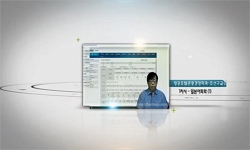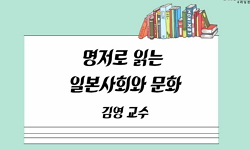This paper discusses how second generation Koreans in Japan started to regard themselves through Kikan Jansori(Quarterly Nagging), a Japanese magazine published by second generation Koreans in Japan from 1979 until 1981. The questionnaire section and ...
http://chineseinput.net/에서 pinyin(병음)방식으로 중국어를 변환할 수 있습니다.
변환된 중국어를 복사하여 사용하시면 됩니다.
- 中文 을 입력하시려면 zhongwen을 입력하시고 space를누르시면됩니다.
- 北京 을 입력하시려면 beijing을 입력하시고 space를 누르시면 됩니다.

『계간 잔소리』와 재일코리안 2세의 자기의식- 잡지 앙케이트란과 독자투고란을 중심으로 - = Kikan Jansori and SelfAwareness of Second Generation Koreans in Japan: Focused on Magazine Questionnaires and Reader Submissions
한글로보기부가정보
다국어 초록 (Multilingual Abstract)
The number of second generation Koreans who were born and raised in Japan increased in the mid1970s. Unlike the first generation of Koreans who came to Japan, the second generation began to think differently about the ‘ethnic group’ and ‘homeland’ from the first generation. Kikan Jansori is a space that presented such generation gap by solely expressing voices of the second generation. In this magazine, ‘ordinary’ second generation Koreans reveal the awareness that ‘Japan,’ their birthplace and habitat, is another ‘root’ of their life as important as the ‘ethnic group’ and ‘homeland.’ Furthermore, Japan is a place that provides the ‘choice of life’ and ‘route of life’ to them. To second generation Koreans, ‘Joseon’ is a legacy that leads from the present to the future. This is why the two roots are shown in the lifestyle of the second generation.
This paper discusses how second generation Koreans in Japan started to regard themselves through Kikan Jansori(Quarterly Nagging), a Japanese magazine published by second generation Koreans in Japan from 1979 until 1981. The questionnaire section and reader submission section of the magazine show how ‘ordinary’ second generation Koreans living in different places of Japan gain new awareness of their ‘ethnic group’ and ‘homeland’ through their real life experience in Japan.
The number of second generation Koreans who were born and raised in Japan increased in the mid1970s. Unlike the first generation of Koreans who came to Japan, the second generation began to think differently about the ‘ethnic group’ and ‘homeland’ from the first generation. Kikan Jansori is a space that presented such generation gap by solely expressing voices of the second generation. In this magazine, ‘ordinary’ second generation Koreans reveal the awareness that ‘Japan,’ their birthplace and habitat, is another ‘root’ of their life as important as the ‘ethnic group’ and ‘homeland.’ Furthermore, Japan is a place that provides the ‘choice of life’ and ‘route of life’ to them. To second generation Koreans, ‘Joseon’ is a legacy that leads from the present to the future. This is why the two roots are shown in the lifestyle of the second generation.
국문 초록 (Abstract)
잡지의 앙케이트 조사란과 독자투고란은 일본 각지에 살고 있는 ‘보통’의 재일코리안 2세들이 자신의 ‘민족’과 ‘조국’을 일본의 실생활 경험 속에서 새롭게 의식하는 양상을 보여준다.
1970년대 중반이 되면 일본에서 태어나 자란 재일코리안 2세들이 증가한다. 조국에서 일본으로 건너온 1세와 달리 2세는 ‘민족’이나 ‘조국’에 대해 1세와 다르게 생각하기 시작한다. 『계간 잔소리』는 이러한 세대 차이가 온전히 2세들만의 목소리로서 분출되고 있었던 공간이었다. 이 잡지에서 ‘보통’의 2세들은 ‘일본’이라는 공간이 ‘민족’이나 ‘조국’에 못지않게 자신들의 출생지, 삶의 터전으로서 ‘뿌리(root)’라는 의식을 나타낸다. 나아가 일본은 ‘삶의 선택’과 ‘삶의 길(route)’을 열어주는 곳이었다. 또한 그들에게 ‘조선’은 현재에서 미래로 이어지는 유산이다. 그렇기에 두 개의 뿌리는 모두 2세들의 생활 의식 속에서 삶의 여정을 이끌어 주는 것이다.
본고는 1979년에 창간되어 1981년까지 재일코리안 2세들에 의해 일본어로 발행된 『계간 잔소리』를 통해 재일코리안 2세들이 자기 자신을 어떤 존재로 여기기 시작했는지를 고찰했다. 잡지...
본고는 1979년에 창간되어 1981년까지 재일코리안 2세들에 의해 일본어로 발행된 『계간 잔소리』를 통해 재일코리안 2세들이 자기 자신을 어떤 존재로 여기기 시작했는지를 고찰했다.
잡지의 앙케이트 조사란과 독자투고란은 일본 각지에 살고 있는 ‘보통’의 재일코리안 2세들이 자신의 ‘민족’과 ‘조국’을 일본의 실생활 경험 속에서 새롭게 의식하는 양상을 보여준다.
1970년대 중반이 되면 일본에서 태어나 자란 재일코리안 2세들이 증가한다. 조국에서 일본으로 건너온 1세와 달리 2세는 ‘민족’이나 ‘조국’에 대해 1세와 다르게 생각하기 시작한다. 『계간 잔소리』는 이러한 세대 차이가 온전히 2세들만의 목소리로서 분출되고 있었던 공간이었다. 이 잡지에서 ‘보통’의 2세들은 ‘일본’이라는 공간이 ‘민족’이나 ‘조국’에 못지않게 자신들의 출생지, 삶의 터전으로서 ‘뿌리(root)’라는 의식을 나타낸다. 나아가 일본은 ‘삶의 선택’과 ‘삶의 길(route)’을 열어주는 곳이었다. 또한 그들에게 ‘조선’은 현재에서 미래로 이어지는 유산이다. 그렇기에 두 개의 뿌리는 모두 2세들의 생활 의식 속에서 삶의 여정을 이끌어 주는 것이다.
참고문헌 (Reference)
1 尹健次, "「在日」を生きるとは" 岩波書店 1992
2 金石範, "「在日」とはなにか" (18) : 1979
3 박용복, "재일코리안사전" 선인 2012
4 이영호, "재일조선인 잡지 『계간 마당(季刊まだん)』과 민중문화- 지면의 구성과 전통 담론을 중심으로 -" 일본학연구소 46 : 205-225, 2018
5 "座談会・くたばれ民族!?" (3) : 1975
6 "季刊ちゃんそり (1号-8号" ちゃんそり社 1981
7 水野直樹, "在日朝鮮人 歴史と現在" 岩波書店 2015
8 "在日二世の生活と意見 <座談会>" (8) : 1976
1 尹健次, "「在日」を生きるとは" 岩波書店 1992
2 金石範, "「在日」とはなにか" (18) : 1979
3 박용복, "재일코리안사전" 선인 2012
4 이영호, "재일조선인 잡지 『계간 마당(季刊まだん)』과 민중문화- 지면의 구성과 전통 담론을 중심으로 -" 일본학연구소 46 : 205-225, 2018
5 "座談会・くたばれ民族!?" (3) : 1975
6 "季刊ちゃんそり (1号-8号" ちゃんそり社 1981
7 水野直樹, "在日朝鮮人 歴史と現在" 岩波書店 2015
8 "在日二世の生活と意見 <座談会>" (8) : 1976
동일학술지(권/호) 다른 논문
-
‘전후’ 재일조선인 스포츠커뮤니티의 기원과 형성(1945-1950)
- 동국대학교 일본학연구소
- 유임하
- 2019
- KCI등재
-
재일코리안 민족교육을 둘러싼 정치성- 1970년대 자주민족학급의 사례를 중심으로 -
- 동국대학교 일본학연구소
- 김웅기
- 2019
- KCI등재
-
「若者ことば」의 지속성에 관한 고찰 - 『現代用語の基礎知識』을 중심으로 -
- 동국대학교 일본학연구소
- 노황희
- 2019
- KCI등재
-
‘거울’로서 재일조선인 - <잊혀진 황군>의 재일조선인 재현에 대한 비판적 검토-
- 동국대학교 일본학연구소
- 이대범
- 2019
- KCI등재
분석정보
인용정보 인용지수 설명보기
학술지 이력
| 연월일 | 이력구분 | 이력상세 | 등재구분 |
|---|---|---|---|
| 2026 | 평가예정 | 재인증평가 신청대상 (재인증) | |
| 2020-01-01 | 평가 | 등재학술지 유지 (재인증) |  |
| 2017-01-01 | 평가 | 등재학술지 유지 (계속평가) |  |
| 2013-01-01 | 평가 | 등재학술지 선정 (등재후보2차) |  |
| 2012-10-30 | 학술지명변경 | 한글명 : 日本學 -> 日本學(일본학) |  |
| 2012-01-01 | 평가 | 등재후보 1차 PASS (등재후보1차) |  |
| 2010-01-01 | 평가 | 등재후보학술지 선정 (신규평가) |  |
학술지 인용정보
| 기준연도 | WOS-KCI 통합IF(2년) | KCIF(2년) | KCIF(3년) |
|---|---|---|---|
| 2016 | 0.71 | 0.71 | 0.58 |
| KCIF(4년) | KCIF(5년) | 중심성지수(3년) | 즉시성지수 |
| 0.54 | 0.51 | 0.957 | 0.08 |




 KCI
KCI eArticle
eArticle







